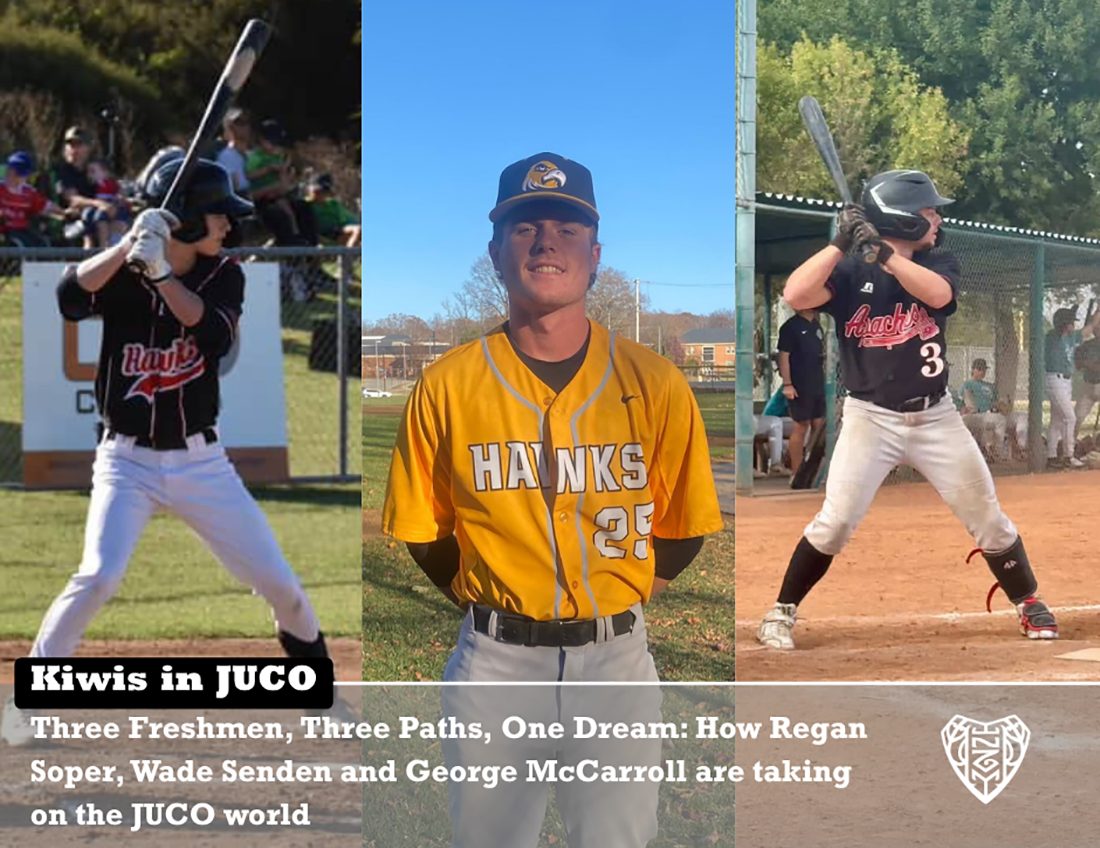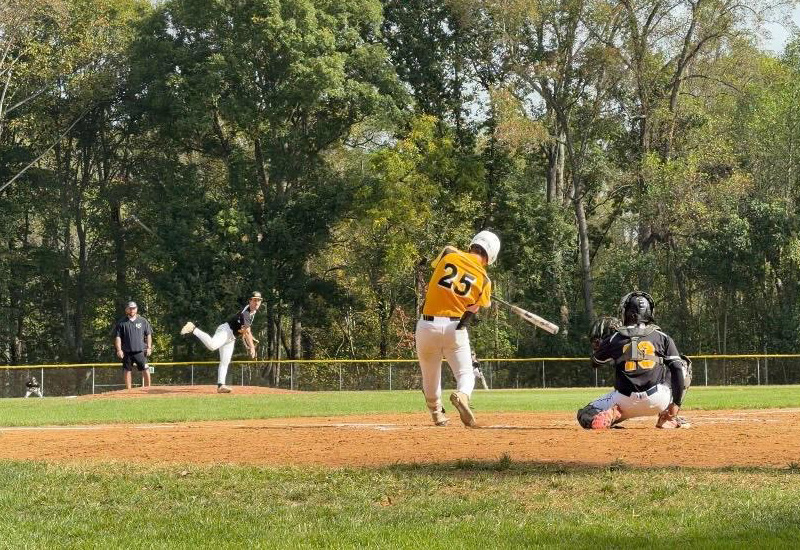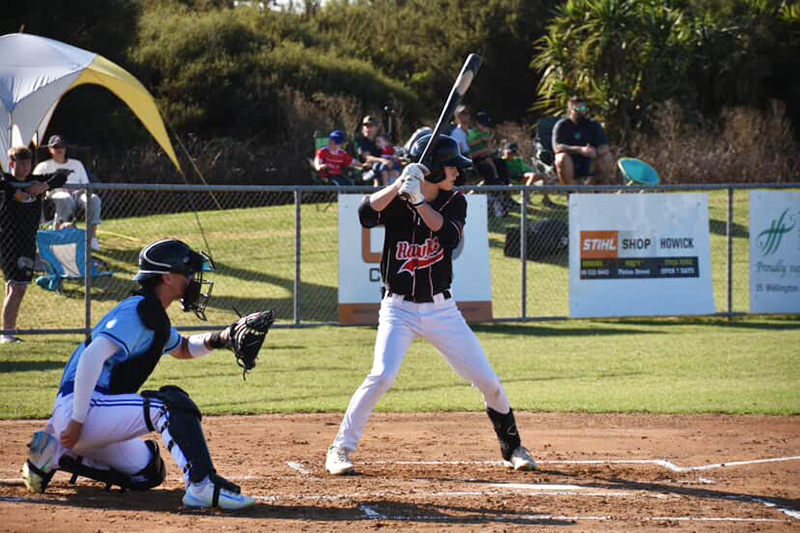For most New Zealand baseball players, the road to U.S. college baseball is anything but straightforward. There are no recruiting pipelines running through Wellington or Auckland, no scouts casually dropping into weekend tournaments, and no easy playbook for how to get noticed from thousands of kilometres away.
But for three Kiwi freshmen — George McCarroll (Cochise College, Arizona), Wade Senden (College of Southern Maryland), and Regan Soper (Umpqua Community College, Oregon) — that challenge wasn’t a deterrent. It was the start of an adventure.
Spread across different states, conferences, climates, and cultures, the trio share a common story: they took the harder path. They emailed, they messaged, they filmed, they lifted, they learned. And today, they’re living their dream as college athletes, carrying the silver fern with them into one of the most competitive levels of baseball in the world.
And they’re just getting started.
None of the three landed their opportunity through perfect connections or chance discovery, they created their own opportunities.
For George, the Cochise College outfielder, it all started with a simple but relentless approach: email schools until something sticks. He reached out to former Kiwi players from the JUCO world like Scott Drinkwater, Maclain Roberts, and Tait Anderson to understand the process before firing off message after message to coaches across the U.S. Cochise quickly became the clear choice. The programme’s long-standing success in the notoriously competitive Arizona conference — widely considered the strongest JUCO conference in the country — stood out immediately. Even more importantly, Cochise has a proven track record of moving players on to strong four-year schools. For George, who hopes to continue his baseball journey at the next level, it was exactly the environment he wanted.
Wade’s strategy was similar, except his battleground was Twitter as well, not just emails. His path was shaped by a clear sense of what he needed in his first year of college baseball. “I decided on the JUCO route because I felt there was a better chance of getting playing time during my first year,” he explained — a priority that guided every step of his recruitment. Hours spent researching programmes, sending messages and emails, and posting video eventually led him to CSM, where Coach Zach Roll became the difference-maker. “His positive attitudes, the constant check-ins, that stood out,” Wade says. The international-friendly environment sealed it.
And then there’s Regan, whose recruitment experience was as JUCO as it gets: gritty, chaotic, and entirely self-driven. He used Twitter, had minimal outside help, and worked alongside his dad to navigate the U.S. system. When Umpqua coach Jeremiah Robbins reached out after seeing him online, Regan jumped at the chance. “It was the cheapest and easiest option,” he says bluntly, but it’s been the perfect fit.
Despite being thousands of kilometres apart now, the three freshmen all learned the same lesson early: if you’re a Kiwi wanting to play in the States, no one’s doing it for you. You have to chase it yourself.
In a single semester, they went from familiar Kiwi landscapes to three totally different corners of the U.S.
George landed in Douglas, Arizona — a small desert town where the heat hits different and the windless days are a welcome change from Wellington’s breezy personality. The weather shocked his body at first. Fatigue came easily, but he much prefers it to windy Wellington. And while Douglas is quieter than he’s used to, that’s become a blessing, “It forces me to focus on baseball and school.”
Wade, meanwhile, found himself on the lush, bustling East Coast just outside Washington, D.C., a place where there’s always something to do. “I love the greenery,” he says. The bigger adjustment wasn’t the culture shock but the flatmate situation: a house full of Americans and Latino teammates. With no school-provided accommodation, he had to figure out housing on his own — another challenge layered onto an already packed freshman year. But it’s become part of the rhythm of his new life. Surrounded by Spanish-speaking teammates, he’s started picking up the language one phrase at a time, using it to connect better and be the kind of teammate who communicates across cultures rather than letting barriers get in the way.
Regan settled into Roseburg, Oregon, a small, tight-knit college town where the community rallies behind Umpqua athletics. It’s quieter than he expected, but in the best way. The baseball team lives together in the legendary “Hawks Nest,” complete with a hitting facility inside. JUCO perfection.
Three freshmen, three wildly different environments — but each one feels exactly right.
If they thought they worked hard in New Zealand, JUCO baseball quickly corrected them. George’s routine at Cochise looks almost military: 5:30 a.m. runs to start the day, classes then long practices from 1:00 to 4:30 p.m., weights in the evening, study hall squeezed in from 6:15 to 7pm, and fall games every Friday. “The college grind is real,” he says, yet he’s embraced every part of it, finishing the fall with a .530 batting average. Wade’s daily life is no easier, if anything, it’s a masterclass in time management. A typical day at the College of Southern Maryland starts with 6 a.m. lifts on Tuesdays and Thursdays, followed by classes from 8:30 to 11:30. Study hall runs from 11:30 to 1, weights again from 1 to 2, sprints from 2 to 2:30, and cage work from 2:30 to 3:30 before team practice kicks off at 4. Most weekends are filled with doubleheaders against other colleges or competitive scrimmage teams. And even with that nonstop schedule, he’s kept a perfect 4.0 GPA, proof that the “student” half of student-athlete is just as important to him as the baseball. Regan’s schedule completes the trifecta: 6 a.m. weights every morning, classes during the day, a crucial mid-afternoon nap, and practices running from 3:30 to 6 p.m. Umpqua plays old-school, hard-nosed baseball — gritty, demanding, and work-first — exactly the kind of environment where Regan thrives.
And whether it’s George facing 90+ mph more often than ever, Wade discovering the difference a real S&C program makes, or Regan enjoying the camaraderie that comes with surviving JUCO days together, all three freshmen agree: this level is no joke, but it’s where they belong.
Despite their different experiences, the trio share similar breakthroughs.
George’s biggest growth has come at the plate — specifically in his approach and understanding of pitch spin. “I’ve never thought so much about the spin of the ball off the bat,” he says.
Wade has taken huge steps both mentally and physically. The structured training at CSM has rapidly improved his strength, while varsity-level competition has taught him the value of consistency. His coaches emphasise situational awareness, approach, and leadership — pushing every player to grow not just physically, but mentally as well. And his first extra-base hit — a shot off the left-centre wall — lit a spark that hasn’t gone out since.
Regan’s biggest strides have come in the weight room, where having a real strength coach and consistent programming has transformed his strength, size and confidence. He’s also sharpening his mental game, adjusting to more direct coaching styles, and growing into the grind.
Three players, three states, one shared truth: JUCO either breaks you… or makes you stronger. These three are getting stronger.
Each of them has felt the impact of carrying New Zealand baseball into the U.S. system. George didn’t expect to feel so patriotic, but distance brings clarity. “I never really expressed my love for New Zealand, but living away from home has definitely changed things,” he says. “People in America don’t have a lot of knowledge about New Zealand, but they definitely have an appreciation for our culture and country.”
Wade wants to give back to the Kiwi baseball community when he’s done, sharing what he’s learned so more players can follow in his footsteps.
Regan finds daily comfort in staying connected with other New Zealanders overseas, especially Wade. That support network matters more than people realise.
Together, they’re part of a growing wave of Kiwi athletes proving they can compete, adapt, and thrive in one of the toughest baseball environments in the world.
Despite being freshmen, all three have their eyes on bigger goals: George wants to make the spring roster, earn a starting role, help Cochise contend, and eventually transfer to a strong four-year program. Wade’s goals include hitting above .300, maintaining his perfect GPA, continuing to build discipline, and keep pushing toward becoming a complete player. Regan, like George, also wants to earn a roster spot, compete for a starting role, and use Umpqua as a launchpad to a four-year school.
Long-term, all three want to continue climbing — whether that leads to bigger colleges, professional opportunities, or a chance to give back to the next generation of Kiwi players.
If younger New Zealand players want to get where they are, the trio has a message: George stated, “Never take your ability for granted. What works at home won’t automatically work in college. Take every day as an opportunity to get better. Prepare early — on the field and in the weight room.”
Wade emphasises working hard and making sure to get your video out on social media. He echoed a phrase told to him by his dad many times: “Hard work beats talent when talent doesn’t work hard.”
Regan offered, “Don’t rush the recruiting process. Prepare early, mentally and physically. And get here — because Americans love the accent and the experience is incredible.”
Three young New Zealanders, three very different stories, but one shared dream. They’re not just representing themselves or their colleges. They’re representing an entire baseball community back home watching proudly as they grind, grow, and battle their way through the JUCO world.
Arizona, Maryland, Oregon — three completely different landscapes.
One journey.
And this is only the beginning.
Article by: Marina Lough (Baseball New Zealand).



